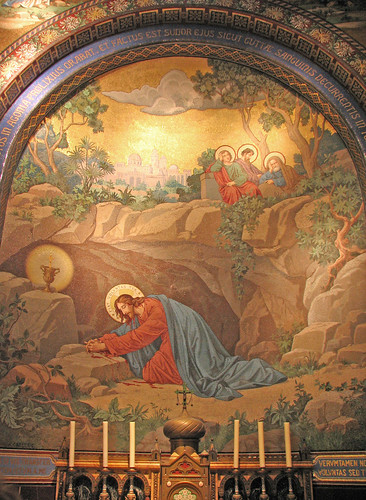 “Like the deer that yearns for flowing streams, so my soul longs for you, O God. My soul thirsts for God, the living God. When shall I come and behold the face of God? My tears have been my food, day and night, while people say to me continually, ‘Where is your God?’” (Ps 42: 1-3).
“Like the deer that yearns for flowing streams, so my soul longs for you, O God. My soul thirsts for God, the living God. When shall I come and behold the face of God? My tears have been my food, day and night, while people say to me continually, ‘Where is your God?’” (Ps 42: 1-3).Where is your God? Where is God in the time of trial, of testing, of our coming to judgement, to the crisis of our lives? Mark offers us an example of faith and prayer in the prayer of Jesus. It is, paradoxically, on the example of his lonely waiting on God, abandoned by his friends, that the Christian community of fellowship in the Spirit will be built. Jesus prays to God, alone, in the Garden; as later he will cry out to God, alone, on the Cross. There is no answer in the Garden, as later on the Cross Jesus’s dying cry will be met with silence. Where is your God?
But like the psalmist “Hope in God; for I shall again praise him, my help and my God” (Ps 42: 5b – 6; 11b) Jesus concludes his petition with an act of self-abandonment to the Father’s will “yet not I will, but what you will"; in terror and fear of death, yet still determined to trust in God. But what Word has the Father, except his self-communication in the Son? Jesus then tells the disciples – who have, as usual in Mark’s presentation, failed him completely - to pray that they are not brought to the time of trial (as we pray in the Our Father) because they are clearly not yet able to cope with it. Yet he nonetheless permits them to accompany him, even though they will fall away “Arise, let us go hence”.
Arise, let us go hence. That phrase is used in an ancient homily read every Holy Saturday, between our commemoration of the crucifixion and our celebration of the Resurrection, God’s silent response which remakes our world. Arise, let us go through all our sufferings into the day that the Lord has made new.
No comments:
Post a Comment